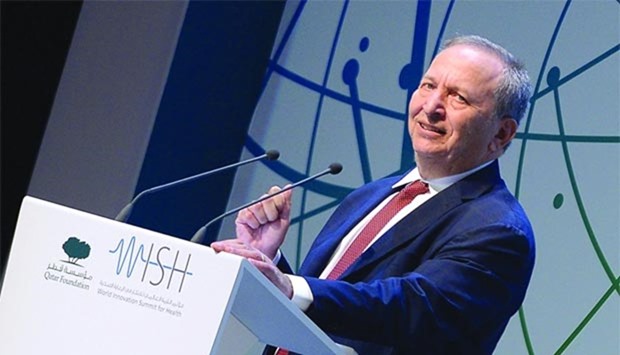A major reallocation of global aid for health is necessary, an international economic expert told the World Innovation Summit for Health (WISH) on Wednesday.
“Certain countries face unrest and conflicts and the national government is unable to fulfil several of its responsibilities. The international community must step in such situations to provide adequate help,” said Professor Lawrence Summers, president Emeritus and Charles W Eliot University professor at Harvard University and the former chief economist of the World Bank.
There are less than two dozen countries under this category, he said while disclosing that a new, year-long working group focusing on international collective action for health is launched with the support of Qatar Foundation for Education Science and Community Development and Bill & Melinda Gates Foundation.
"The new working group will be in action from today," announced Prof Summers, also its chair.
The official said that several countries will witness remarkable economic growth over the next 20 years and this is a clear opportunity. “The remarkable dividend will come from the economic growth of low and middle income countries. The world in 2035 requires about $70bn per year for health requirements. It represents less than 1% of the GDP of these countries” he pointed out.
“If countries can make use of 1% of their extra income in implementing health policies and invest wisely, this is one major step to improve human welfare. This will also yield in increased returns for these countries. If local resources are sufficient to meet national challenges, if substantial extra resources are substantially available, it suggests that one should look at global investment in healthcare,” he stressed.
By highlighting the example of several health initiatives in the past, Prof Summers explained that "if a country invests in several areas such as vaccine development or other services and research programmes, it not only helps the country economically but also promotes global healthcare. This will also lead to more returns for the country.”
Prof Summers said that global co-operation was important for the improvement of healthcare. He cited the example of how the US fought polio and how it brought a lot of benefits to the country and the world.
“In 1953, the polio epidemic in the US led to the invention of a vaccine. It led to the global public good too. The US spent about $26mn to develop a polio vaccine. It brought back $180bn for the country and today the world stands on the brink of eradicating polio,” he recalled.
He noted that the WHO aims to reduce tobacco use by one-third in 2025 which can avoid 200mn deaths over the course of this century by helping the current smokers to quit and urging teenagers not to light up.
There are less than two dozen countries under this category, he said while disclosing that a new, year-long working group focusing on international collective action for health is launched with the support of Qatar Foundation for Education Science and Community Development and Bill & Melinda Gates Foundation.
"The new working group will be in action from today," announced Prof Summers, also its chair.
The official said that several countries will witness remarkable economic growth over the next 20 years and this is a clear opportunity. “The remarkable dividend will come from the economic growth of low and middle income countries. The world in 2035 requires about $70bn per year for health requirements. It represents less than 1% of the GDP of these countries” he pointed out.
“If countries can make use of 1% of their extra income in implementing health policies and invest wisely, this is one major step to improve human welfare. This will also yield in increased returns for these countries. If local resources are sufficient to meet national challenges, if substantial extra resources are substantially available, it suggests that one should look at global investment in healthcare,” he stressed.
By highlighting the example of several health initiatives in the past, Prof Summers explained that "if a country invests in several areas such as vaccine development or other services and research programmes, it not only helps the country economically but also promotes global healthcare. This will also lead to more returns for the country.”
Prof Summers said that global co-operation was important for the improvement of healthcare. He cited the example of how the US fought polio and how it brought a lot of benefits to the country and the world.
“In 1953, the polio epidemic in the US led to the invention of a vaccine. It led to the global public good too. The US spent about $26mn to develop a polio vaccine. It brought back $180bn for the country and today the world stands on the brink of eradicating polio,” he recalled.
He noted that the WHO aims to reduce tobacco use by one-third in 2025 which can avoid 200mn deaths over the course of this century by helping the current smokers to quit and urging teenagers not to light up.


